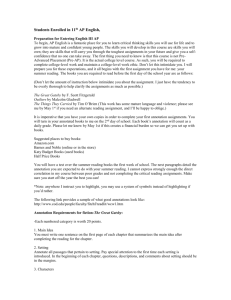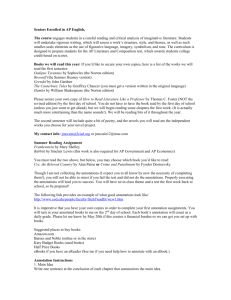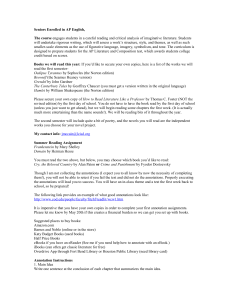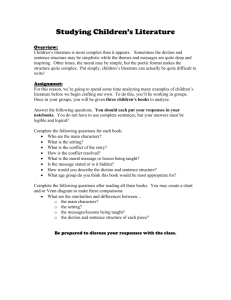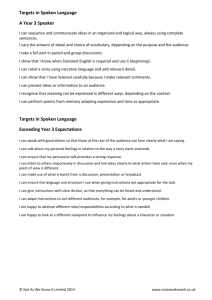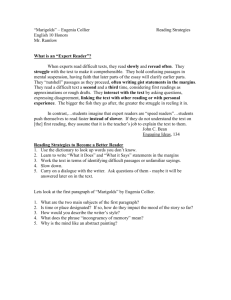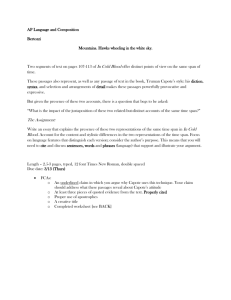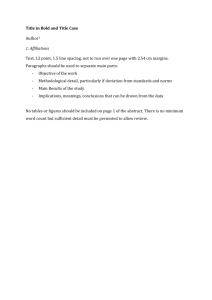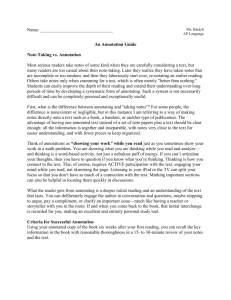English III SR Assignment
advertisement
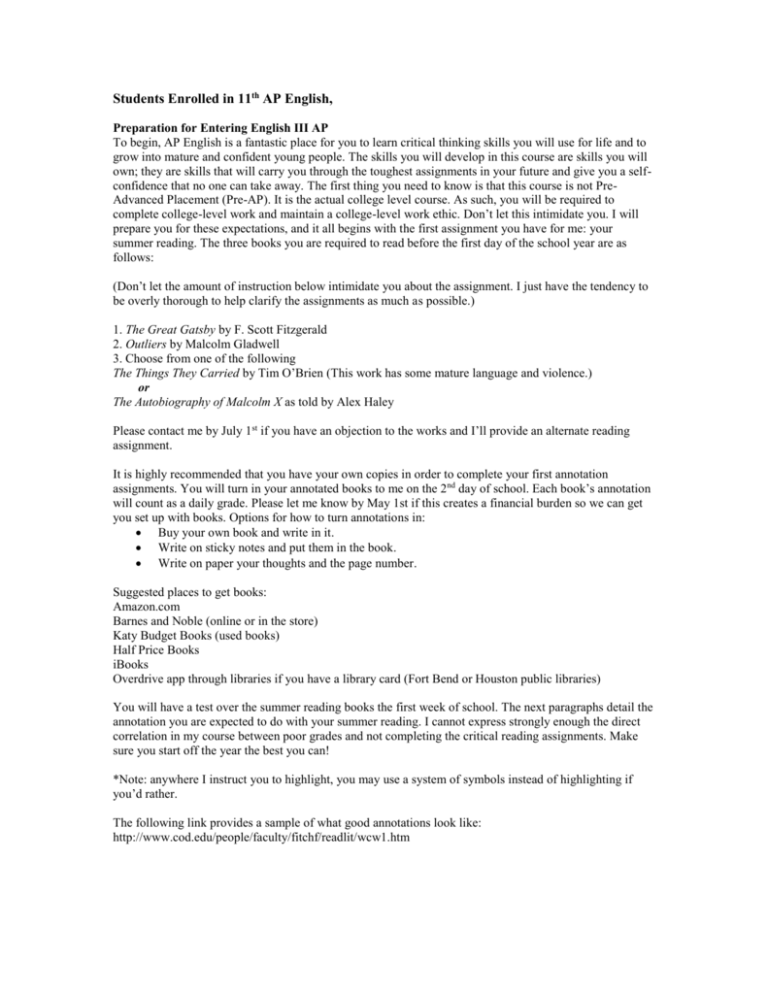
Students Enrolled in 11th AP English, Preparation for Entering English III AP To begin, AP English is a fantastic place for you to learn critical thinking skills you will use for life and to grow into mature and confident young people. The skills you will develop in this course are skills you will own; they are skills that will carry you through the toughest assignments in your future and give you a selfconfidence that no one can take away. The first thing you need to know is that this course is not PreAdvanced Placement (Pre-AP). It is the actual college level course. As such, you will be required to complete college-level work and maintain a college-level work ethic. Don’t let this intimidate you. I will prepare you for these expectations, and it all begins with the first assignment you have for me: your summer reading. The three books you are required to read before the first day of the school year are as follows: (Don’t let the amount of instruction below intimidate you about the assignment. I just have the tendency to be overly thorough to help clarify the assignments as much as possible.) 1. The Great Gatsby by F. Scott Fitzgerald 2. Outliers by Malcolm Gladwell 3. Choose from one of the following The Things They Carried by Tim O’Brien (This work has some mature language and violence.) or The Autobiography of Malcolm X as told by Alex Haley Please contact me by July 1st if you have an objection to the works and I’ll provide an alternate reading assignment. It is highly recommended that you have your own copies in order to complete your first annotation assignments. You will turn in your annotated books to me on the 2 nd day of school. Each book’s annotation will count as a daily grade. Please let me know by May 1st if this creates a financial burden so we can get you set up with books. Options for how to turn annotations in: Buy your own book and write in it. Write on sticky notes and put them in the book. Write on paper your thoughts and the page number. Suggested places to get books: Amazon.com Barnes and Noble (online or in the store) Katy Budget Books (used books) Half Price Books iBooks Overdrive app through libraries if you have a library card (Fort Bend or Houston public libraries) You will have a test over the summer reading books the first week of school. The next paragraphs detail the annotation you are expected to do with your summer reading. I cannot express strongly enough the direct correlation in my course between poor grades and not completing the critical reading assignments. Make sure you start off the year the best you can! *Note: anywhere I instruct you to highlight, you may use a system of symbols instead of highlighting if you’d rather. The following link provides a sample of what good annotations look like: http://www.cod.edu/people/faculty/fitchf/readlit/wcw1.htm Annotation Requirements for fiction-The Great Gatsby: -Each numbered category is worth 20 points. 1. Main Idea You must write one sentence on the first page of each chapter that summarizes the main idea after completing the reading for the chapter. 2. Setting Annotate all passages that pertain to setting. Pay special attention to the first time each setting is introduced. In the beginning of each chapter, questions, descriptions, and comments about setting should be in the margins. 3. Characters As you read, annotate passages directly and indirectly characterizing the main characters. Make a list of the characters in the front inside cover and tell whom the character is; list page numbers where noteworthy moments in the character’s life or development occur. In the margin directly beside the passage, write the name (or abbreviation of the name) of the character about whom you are annotating. Noteworthy passages relating to character include the following information: -The first time a character is introduced -Character description (a particular dominant trait or several characteristics) -The character’s values, motives, goals, and beliefs - How the character interacts with other characters - How the character compares to other characters - The character’s thoughts and actions - Contradictions in the character’s thoughts, words, or actions (These are the prompts you should answer in the margins) After completing the book, inside the front cover, write a character list of the main characters along with a short character description. Include at least two page references to key scenes or moments of character development. 4. Vocabulary As you read, locate unfamiliar words. Circle these unfamiliar words in the text. As good reading practice, look the words up as you read. You might write a definition or synonym in the margin to help you learn the words. Also inside the back cover, write at least 5 words from the text that best characterize the author’s overall diction. Put a big circle around this list, and write below it what type of diction it is (you can use more than one word if you’d like). Possible words to describe diction: Monosyllabic, polysyllabic, connotative, denotative, formal, informal/standard, colloquial, euphonious, cacophonous, clichéd, slang, pedestrian, pedantic, vulgar, hyperbolic, understated, concrete, abstract, active, passive, literal, figurative, objective, or subjective. (I’ve included a list of definitions to these terms.) Last inside the back cover, write five words that indicate the author’s tone. Also, circle this list and then put one word that describes the tone below it. 5. Questions/Comments Mark passages that intrigue, please, displease, or confuse you. Ask questions in the margins, make comments—talk back to the text. Since you are reading the novel over the summer, these questions will be of special value during class discussion. These questions and comments need not be limited to the text. Successful readers make text-to-world connections, text-to-text connections, and text-to-self connections as they read. If a character reminds you of your Uncle Fred, it is perfectly acceptable to write in the margin, “Uncle Fred.” If you are reminded of another book, movie, or television show, write the connection in the margin. If you think of something going on in the news or the world or have a question about how a passage may relate to the world, put that in the margin, as well. In Brief: Inside Front Cover: Character list with character summary and page references Inside Back Cover: Diction; Tone Side Margins: Character and setting notes, questions, remarks, and connections should be written in the margins. Beginning of Each Chapter: Main idea sentence End of Each Chapter: Questions—write one open-ended question—a question that cannot be answered with a simple “yes” or “no” at the end of each chapter. What are you left thinking about? Annotation Requirements for Outliers (requirements are different because it is a non-fiction work) -Each numbered category is worth 25 points. 1. Highlight the claims the author makes, and write in the margin whether he uses ethos, logos, and/or pathos for the evidence for those claims. 2. Vocabulary -As you read, locate unfamiliar words. Circle these unfamiliar words in the text. As good reading practice, look the words up as you read. You might write a definition or synonym in the margin to help you learn the words. -Also inside the back cover, write at least 5 words from the text that best characterize the author’s overall diction, and write the page number those words occur. Put a big circle around this list, and write below it what type of diction it is (you can use more than one word if you’d like). -Last inside the back cover, write five words that indicate the author’s tone, and write the page number the words occur. Also, circle this list and then put one word that describes the tone below it. 3. Main Idea You must write one sentence next to the title of each chapter that summarizes the main idea of the chapter after you complete reading it. 4. Questions—write one open-ended question—a question that cannot be answered with a simple “yes” or “no” at the end of each chapter. What are you left thinking about? Annotation requirements for The Things They Carried (This is fiction, but it has many similar elements to nonfiction since it is semi-autobiographical of O’Brien’s service in the Vietnam War.) -Each numbered category is worth 20 points. 1. Characters For each of the following, annotate for characterization: Jimmy Cross Henry Dobbins Dave Jensen Ted Lavender Mitchell Sanders Norman Bowker Rat Kiley Kiowa Lee Strunk Tim O’Brien Make sure to mark where it is stated in the book the military specialty (i.e. platoon leader) if provided, what they physically carried, and what they carried emotionally. Also, include the following list as applicable. - Character description (a particular dominant trait or several characteristics) - The character’s values, motives, goals, and beliefs - How the character interacts with other characters - How the character compares to other characters - The character’s thoughts and actions - Contradictions in the character’s thoughts, words, or actions 2. Main Idea You must write one sentence next to the title of each chapter that summarizes the main idea. 3. Questions/Comments Mark passages that intrigue, please, displease, or confuse you. Ask questions in the margins, make comments—talk back to the text. Make connections personally, to movies, books, television, or real life. 4. Reflect on each chapter after reading. What are your thoughts, questions, and insights? Write these down at the end of each chapter (at least one sentence). Consider such things as what impressions each man’s story made on you, what the nature of war creates in a man, and what implications there are for society and the individual. 5. Themes: The themes listed below are all found in this book. For each of the themes listed, find several (at least 3) examples in the book. Write which theme you are identifying next to the lines in the book. 1- Guilt and shame 2- Loyalty 3- Courage and Heroism 4- Loneliness Annotation requirements for The Autobiography of Malcolm X (This is nonfiction but has narrative elements) 1. Highlight the changes in appearance, character, and nature in Malcolm’s character throughout the book. 2. Main Idea You must write one sentence next to the title of each chapter that summarizes the main idea. 3. Questions/Comments Mark passages that intrigue, please, displease, or confuse you. Ask questions in the margins, make comments—talk back to the text. Make connections personally, to movies, books, television, or real life. 4. Reflect on each chapter after reading. What are your thoughts, questions, and insights? Write these down at the end of each chapter (at least one sentence). Consider such things as what impressions the story made, what the nature of commitment, disappointment, and enlightenment creates in a man, and what implications there are for society and the individual. 5. Themes: The themes listed below are all found in this book. For each of the themes listed, find several (at least 3) examples in the book. Write which theme you are identifying next to the lines in the book. 1-Racism (and its change over time) 2-Identity 3-Family 4-Travel and transformation The summer reading assignment will truly give you the foundation to help you achieve great success in the course. I hope you all enjoy the summer, and I look forward to meeting you soon. Please contact me with any questions you may have at jmccain@lcisd.org. Sincerely, Julie McCain 11th and 12th AP English teacher English Department Chair Diction definitions monosyllabic- words with one syllable polysyllabic- words with multiple syllables connotative- emotional implications and associations words may carry denotative, basic meaning of words (dictionary meaning), independent of emotional coloration or associations formal- use of dignified words, a large vocabulary, and correct grammar informal/standard/colloquial- conversational, typically used for everyday language, simpler language, everyday words, imprecise grammar, sometimes slang terms euphonious- pleasing sounding words cacophonous- harsh, unpleasant sounding words clichéd- expressions used so often that their freshness and clarity have worn off slang- vernacular speech (everyday language), not accepted as suitable for highly formal usage, though much used in conversation pedantic- language which attempts to use words that will improve their importance through the use of phrases that end up sounding pompous, affected, or stilted vulgar-offensive, coarse, base language; language deficient in taste and refinement hyperbolic- exaggerated words understated- the literal sense of what is said falls detectably short of the magnitude of what is being talked about pedestrian-language of the common person, dull, boring, tedious, monotonous, routine concrete- specific and tangible referencing of facts and specific people, places, objects, or acts abstract- conceptual and philosophical; refers to ideas, qualities, conditions, categories and/or relationships active- this kind of sentence will convey action; the person who performed the action will function as the subject of the sentence passive- this kind of sentence will focus on the result more than the action; the subject will come after the verb literal- free from figurative language figurative- impressions created with language; devices such as metaphors, personification, imagery, etc. are often used objective- impersonal, unemotional, unbiased subjective- emotional, biased sentiment Vocabulary List for Reference for The Things They Carried Jargon, Slang, and Acronyms for The Things They Carried AO area(s) of operation A&W fast food franchise AWOL absent without leave ARVIN army of Viet Nam C rations box lunch for in the field CID criminal investigation division Claymore a mine packed with steel pellets CO status conscientious objector status CS tear gas Dustoff medical evacuation or medivac, also any helicopter pickup E-6 non-commissioned officer, 6th level, sergeant (army) EM enlisted man GI Government Issue; another name for a soldier HE high explosive rounds KIA killed in action LBJ Lyndon Baines Johnson, US President from 1963-1969 LP listening post LSA (oil) oil used on rifles and light machinery Lt Lieutenant LZ Gator landing zone named Gator M&Ms comic slang for medical supplies MIA missing in action MP military police MPC military payment certificates, payment instead of dollars P38 small can opener which can be put on a key chain PF popular force, So. Vietnamese militiamen PFC private 1st class, a rank PRC 25 portable radio-telephone Psy Ops psychological warfare operations R & R rest and recreation RF regional force, So. Vietnamese regional force RPGs rocket propelled grenade RTO radiotelephone operator SEATO Southeast Asia Treaty Organization Sin Loi Vietnamese for “sorry about that” SOP standard operating procedure USO Uniformed Services Organization, entertained the troops VC Viet Cong, a south Vietnamese who collaborated with the north
